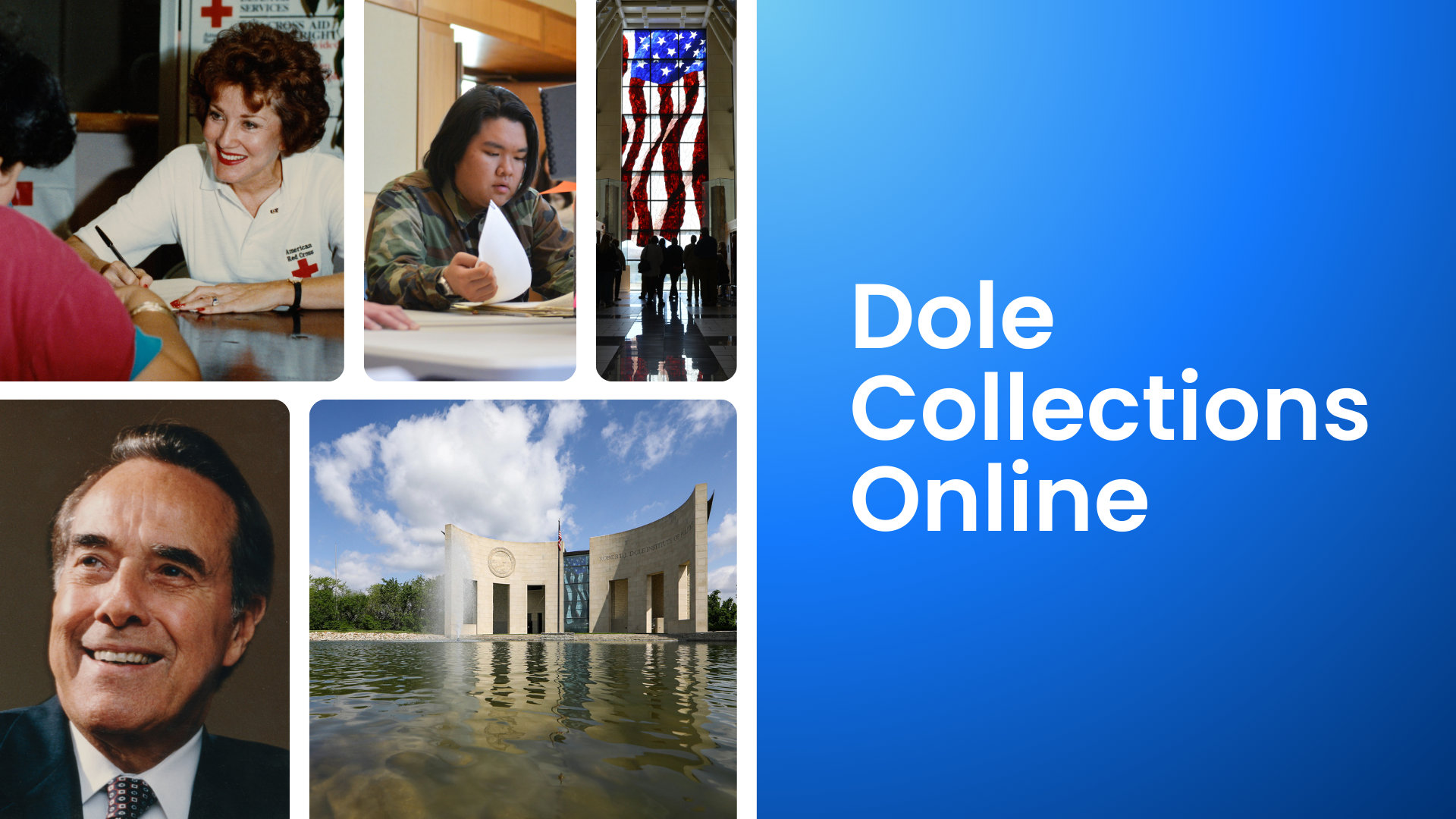Dole Archives Launches New Online Resource to Access Digitized Materials
August 23, 2024 - Features
a Q&A with Marla Weaver | Assistant Archivist for Digital Initiatives

Dole Collections Online features item-level digitization, in-depth metadata, and text-only versions of content—making research more accessible for everyone.
The Robert and Elizabeth Dole Archives and Special Collections recently unveiled Dole Collections Online—a new platform for digital access to archival content. With item-level digitization, in-depth metadata, and text-only versions of content, Dole Collections Online makes researching more accessible for everyone.
To mark the launch of this new online resource, Dole Institute Assistant Archivist for Digital Initiatives Marla Weaver answered some of the most important questions about what this is and how it will help elevate researching our collections.
What is Omeka-S?
Omeka-S is a cultural heritage tool for publishing exhibits and digital materials online. It was designed to make it easy for archives, libraries, and museums to share their rich collections with the world. Omeka-S allows us to showcase more items from our collections in new and innovative ways.
Why debut a new platform now?
The Dole Institute is a founding partner in creating and developing The American Congress Digital Archives Portal, a collaborative, non-partisan project to make congressional archives available online. Since 2021, the Portal has received awards totaling over $400,000 – including two grants from the National Endowment for the Humanities.
Over the development of multiple grant phases, the latest version of the Portal is now designed to ‘harvest’ text and images from partner institutions’ online systems, rather than host the content all on its own.
The new harvesting model meant that we needed to find a new, updated method to display and deliver our digitized archival content. Sharing our materials using Dole Collections Online will enable us to contribute our collections on American Congress Digital Archives Portal.
Why bring congressional collections together in the Portal?
Congressional collections included in the portal are created or received by Members of Congress as documentation of their career, the organization and functions of the office, and the work of office staff. These collections are vital for understanding American democracy and the work of the legislative branch. They show how Congress provides oversight, creates legislation, and represents the American people.
What new features of Dole Collections Online are you most excited about?
I am most excited about the ability that Dole Collection Online gives us to share and display metadata about items, especially accurate text-only versions of archival documents.
Feature: Metadata, controlled vocabularies, and linked data
These terms are standard professional fare in digital libraries, museums, and archives, but may be new to some. ‘Metadata’ is most simply defined as “data about data” – in the case of Dole Archives materials, it would be information about a document or photo. Examples include the dates or subjects of a document.
We plan to provide a great deal of information about each archival item we share. Using standardized descriptive metadata from controlled vocabularies including The Library of Congress Subject and Authority Headings, Getty Vocabularies, ISO, and W3, all partner institutions involved in the portal project are describing their items using the same vocabularies—making it easy for researchers to find information on exactly what they need across multiple institutions.

Dole Collections Online Browse Feature – Users can browse on an item level or narrow down what they are looking for based on criteria like date or subject. Adding metadata about each item makes this possible.
Feature: Text-Only versions of Archival Documents
One of the features we are most proud of is being able to provide accurate text-only versions of archival documents. While this sounds simple enough, text created by Optical Character Recognition (OCR) is not perfect, often misinterpreting words on a page, especially if the document was created before computers, or includes handwritten notes.
We are lucky to have very much appreciated real humans in the archives editing and reviewing the final product. While we have worked very hard to make the text as accurate as possible, we are always in the process of refining our online resources and will continue to update content as needed.
Tell us more about the importance of having accurate full text for archival documents.
Having accurate text is important for multiple reasons. First and foremost, it ensures everyone can access and research our materials, which is of fundamental importance to any archive.
Users who are visually impaired may use a screen reader to access and interpret our materials. Naturally, this reason is nearest and dearest to our hearts; Senator Bob Dole himself championed the Americans with Disabilities Act (ADA). Appropriately, most of the material that will appear online first will directly relate to the passing of the ADA. It will also be helpful to users who are not visually impaired that may still find it difficult to read handwriting or certain text.

On the left is a scan of a handwritten letter to Senator Bob Dole. On the right is the transcribed version of the letter.
Accurate full text from our papers also opens the collections up to new research. In addition to allowing a search engine to more accurately help users find what they are looking for, text mining, sentiment analysis, natural language processing, and other kinds of machine learning can answer impossible questions we could only dream of answering until now.
How many items can I see in Dole Collections Online?
As of the first of July, we have 400 items and counting, comprised of more than 1,550 pages.
As part of the current NEH grant phase, the Dole Archives will make thousands of pages of archival material available in the Portal by mid-2025. This material will cover Senator Bob Dole’s disability advocacy and Senate schedules.
What’s next?
We are just getting started! While Dole Collections Online was implemented in part to make items available for the American Congress Digital Archives Portal, this resource will provide access to accessible collection items for years to come.

Marla Weaver serves as an Assistant Archivist for Digital Initiatives at the Dole Institute of Politics. She joined the Institute after serving as a Library Associate with KU Libraries. A native Kansan, Marla holds a Master of Architecture from the University of Kansas and a Master of Science in Library and Information Science from Syracuse University.
About the Dole Institute
The Robert J. Dole Institute of Politics, a vibrant forum for civil discourse, civic engagement, and idea exchange across the political spectrum, features historical archives, exhibits, and public programs for all ages. Inspired by the public service of native Kansan, veteran, legislator, and statesman Senator Bob Dole and his wife Senator Elizabeth Dole, visitor galleries feature changing exhibits, the Kansas Veterans Virtual Memory Wall, architectural-scale stained glass American flag, and September 11 memorial.
The Dole Institute is committed to universal accessibility in all programs and resources. We are in the process of making all of our web projects fully accessible. An accessible version of the material represented on this site will be made available upon request. Please contact us at doleinstitute@ku.edu to request the material be made available in an accessible format, or for general assistance.